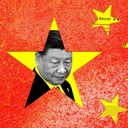China's 2024 outlook will be shaped by decisions beyond its borders

Decisions made by foreign investors and by voters in both Taiwan and the U.S. this year could affect Beijing's own calculus and regional stability.
Why it matters: China is starting 2024 with a weaker economy and facing geopolitical wild cards that have the world on edge. Both could jeopardize Chinese President Xi Jinping's expansive vision for the country.
- Xi aims to annex Taiwan, which would put China on a collision course with the U.S.
- And Xi's desire for restricting the open flow of economic data may hinder his goal of economic growth in spite of "headwinds."
What we're watching: Two crucial elections — neither of them in China — and foreign direct investment in the country will be key indicators of China's path.
1. Taiwan's presidential election. Cross-Strait relations always feature prominently in Taiwan's presidential elections, and that's especially true this year. China's armed forces engage in near-daily incursions close to Taiwan's waters and Xi repeatedly emphasizes China's right to the self-governing island, making China's longstanding vow to take Taiwan seem more tangible.
- On Jan. 13, Taiwanese voters will choose one of three candidates: The Beijing-skeptic Democratic Progressive Party (DPP) candidate William Lai who is leading in the polls, the Beijing-friendly Kuomintang's Hou You-yi, and third party candidate Ko Wen-je, who has said he will follow the outgoing DPP president Tsai Ing-wen's approach.
- Between the lines: Beijing may view the election as a "litmus test for the likelihood of a non-violent unification process," Raymond Kuo, director of the RAND Corporation's Taiwan Policy Initiative, told Axios. A KMT win could reassure Beijing that peaceful unification is still an option.
- What to watch: A DPP win would see Beijing continue to rely on "coercion to affect Taiwan's policies, including additional large-scale military exercises, airspace incursions, information operations, and cyber intrusions," said Kuo. "While Beijing would welcome a KMT victory, Taiwanese public opinion will limit how far the KMT can shift cross-Strait relations."
2. The U.S. presidential election. A second Trump term could be a real wild card for U.S.-China relations and China's geopolitical goals. Trump would likely pursue even tougher tariffs on China in a second term, but a continuance of the isolationist policies of his first term could weaken U.S. standing globally and create an opening for China.
- Between the lines: When asked in October if Beijing would prefer Biden or Trump, former Trump deputy national security advisor Matt Pottinger said," If any candidate shows weakness on Nato, on Ukraine and on Taiwan, that will be the preferred candidate for China, even if it means they have to stomach more tariffs."
- What to watch: Possible Chinese government-backed election meddling, which U.S. intelligence agencies have said increased in the 2022 elections. “Rather than propping up a particular candidate this fall, Chinese election meddling will center around sowing social division, discouraging Americans from voting, and portraying democracy as dysfunctional — all in a bid to undermine America's global standing,” said Craig Singleton, senior fellow at Foundation for Defense of Democracies.
3. The future of foreign direct investment (FDI) in China. Late last year FDI in China dropped for the first time in decades, which analysts took as a sign that growing scrutiny of foreign firms, and particularly restrictions on due diligence and auditing firms, was rattling investors.
- What to watch: If the fall in foreign investor confidence continues, it could persuade the Chinese government to relax some of these very strict policies. But Beijing could also double down, and insist that less transparent economic conditions are the new normal for China's huge economy, forcing investors to comply.